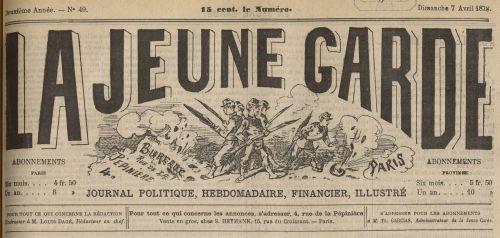#charles hugo
La Jeune Garde was a Bonapartist newspaper that ran from 1877 to 1905 and this is there review of the 1878 production of Les Miserables, drame (Charles Hugo’s adaptation of LM for the stage) so if you wonder who is the HE that Hugo slighted, that would be Napoleon.
The preamble is actually pretty funny to me but the part I especially liked I’ve put in bold because this adaptation (aka the first adaptation) seems to have set the standard for soo many adaptations that came after it in terms of how it abridges the book and they make a good point about how C. Hugo went about it.
It is with most profound sentiment, with the most great respect, and with the most legitimate admiration that we write or pronounce that great name Hugo, which is the living incarnation of that Romantic school from which appeared the masterpieces which constitute the literary glory of our nation.
Following the example of the envious and the slanderous, we will not reproach the poet for his political life: the best among us also have their weaknesses. We will content ourselves to mention in passing the sadness that we felt on reading certain work by the master.
Although he outraged and insulted our political convictions, though he slandered the name of HE to whom we have promised our boundless devotion, it matters very little to us. We don’t want to see in Hugo and never will see in him anything but a sublime poet and a genius; just as we only see in Napoleon a monarch who is good, affable, loved, and esteemed by all who approach him, to whom our country will one day do justice in honoring the idea of having been governed by a sovereign who wanted before all else the happiness of his people.
Having said this in the form of a preamble, let us speak of the play at the Porte-St-Martin:
When a play is adapted from a source that is so powerful and so gigantic as Les Misérables, the spectator should expect many disappointments, not because this adaptation is devoid of interest - may God preserve us from ever implying such a falsehood - but because the author is often obligated, despite his will and his talent, to abridge the plot, to sacrifice a part of the action, and that is in order to comply with the requirements of the stage.
Just as in Balsamo [adapted from the novel by Alexandre Dumas], the play at the Porte-Saint-Martin, only has one problem in our eyes: that of having, as we said above, been submitted to numerous mutilations, mutilations made all the more regrettable because they were done to the most moving pages of this remarkable book. However it would be useful to add, in defense of this drama by Hugo, that these cuts were more necessary than in the case of the play by Dumas.
In effect, Les Misérables was conceived of with a humanitarian goal, resounding with its eloquent and profound thesis, and written in favor of the disinherited classes of humanity; but in order to vanquish certain passages that would have been insurmountable to present in the theater, Charles Hugo contented himself with showing the public just the main characters that play an important role in his father’s masterpiece. That is how we saw, one by one, Jean Valjean, Cosette, Fantine, Javert, etc., etc.
Let us just say simply that the actors have really gone the highest that they could with the roles given to them. Dumaine, assuming the traits of Jean Valjean and M. Madeleine, was by turns the terrible convict, and the good man who is sensible and just, exactly as the book made him known to us.
Taillade played the classic policeman Javert strikingly. This role brings great honor to an actor whose theatrical career has been a long string of successes and as for Lacressonnière, there is no one better than him to play the part of Monseigneur Myriel, full of selflessness and goodness.
Mlle Jeanne Essler is not the Fantine that we dreamed of in reading the novel. Of course, we cannot reproach this imminent actress who did more than her duty when charged with a role as crushing as that of the poor woman who, because of her maternal love, submits to all humiliations, all tortures of the soul and who tumbles all the way down the dark pit of infamy in order to save her child from poverty.
Mlle Jeanne Essler is among the best actress, it is true, but we would have preferred to see an actress whose youth would remind us of the heroic Fantine. This simple remark can not weaken the success that Mlle Jeanne Essler achieves each evening before the audience at the Porte-St-Martin. To finish, let us speak of the little Daubray who, in the role of Cosette, showed herself to be a consummate artist in producing tears from the whole audience. This child - and in this we are sharing the opinion of most of our brothers - will one day become an elite actress. Keep going mademoiselle! We hope that you will not make liars out of us.
In summary, Les Misérables was staged with luxurious sets and décor that surpass anything we have seen before in the theater and we are grateful for this lavishness. This deployment of luxury is a fitting tribute to the drama of our eminent poet who provided the French stage with so many works of art.
This is such a fascinating review AND an interesting demonstration of at least this particular bonapartist’s worldview at the time, how the bonapartists really did see themselves as progressives while also having this unquestioning, worshipping admiration for a long dead military dictator…
Also I can’t get over how EASILY I can imagine this being written by Marius
Post link

